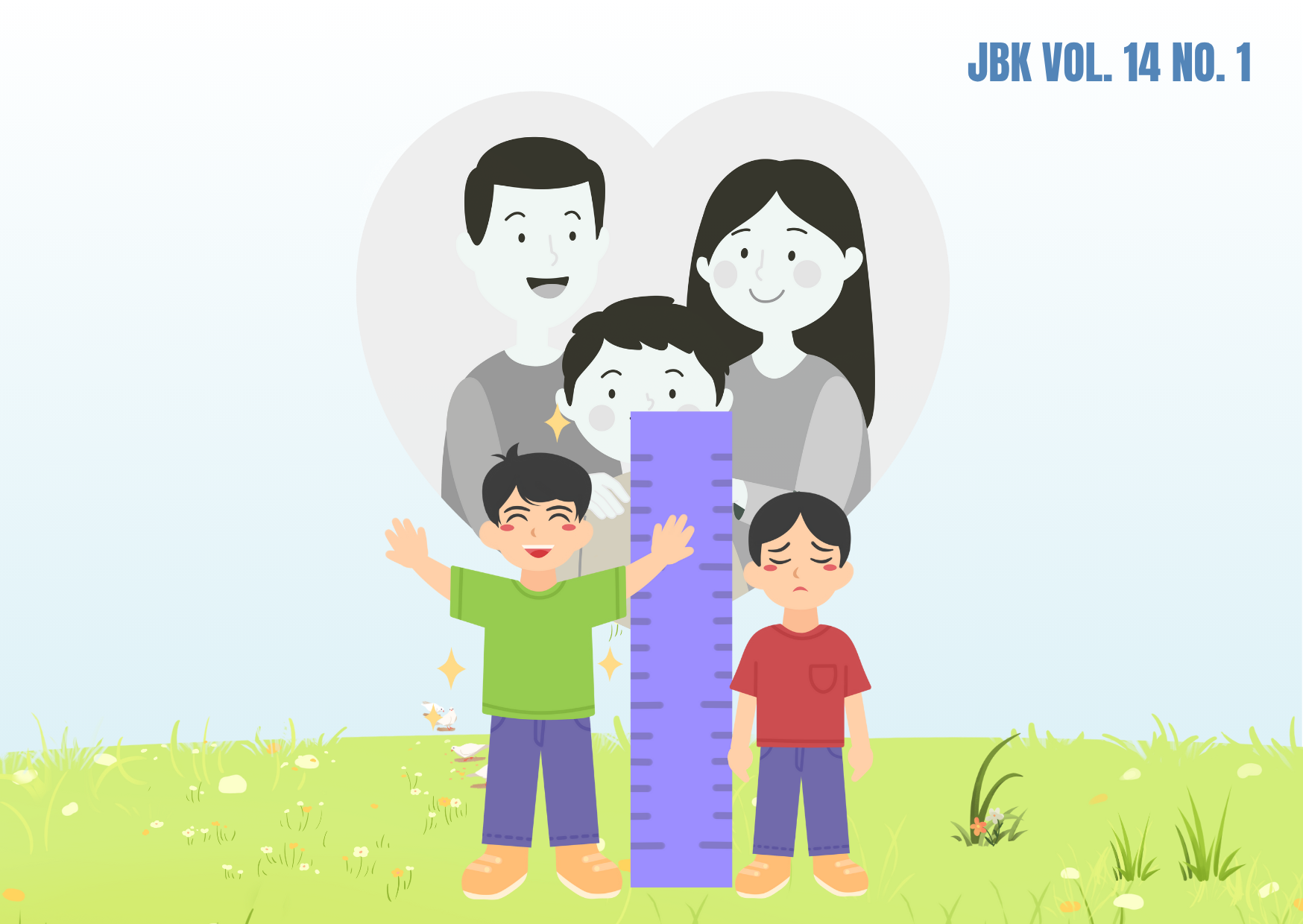'DO I HAVE TO CHOOSE?' TWO CHILDREN VS FOUR CHILDREN IN BALI'S FAMILY PLANNING PROGRAM

Downloads
The Indonesian family planning program has been running for over five decades. Until the present, the implementation of this program still generates debate over important policy issues. On June 14th, 2019, the Balinese provincial government released a new pro-natalist family planning policy No.1545 (Keluarga Berencana Krama Bali) to respond to the concerns from the national family planning program two-child policy success. What are the implications for Balinese women's position in response to the political and cultural policies that impact their reproductive rights? This study analyzes the tensions between the national family planning program's two-child policy and the recent local Balinese Keluarga Berencana Krama model by focusing on Balinese women's perspectives. Ethnographic research was conducted from January to February 2020 in Bali. This study indicates that the women's fertility decisions were constrained by patrilineal structures, economic stresses, and government population policies. Krama Bali, which encourages a four children model according to the Balinese naming system, complicates the triple burden impacts on Balinese women's agency. The new pro-natalist provincial policy explicitly prioritizes cultural values and indirectly exacerbates the pressure to produce inheriting sons. Balinese women had to choose between cultural preservation and economic considerations, which intensified the tensions between their productive, reproductive, and customary (adat) obligations. Internal and external pressures imposed upon the Balinese women participants have forced them to navigate conflicting economic, political, and cultural demands with varying degrees of agency.
Hull TH, Hull VJ. From Family Planning to Reproductive Health Care: A Brief History. In: Hull TH, editor. People, Population, and Policy in Indonesia. Singapore: Equinox Publishing; 2005. p. 1–69.
Harmadi SHB. Program Keluarga Berencana di Era Otonomi Daerah. Warta Demografi. 2011;41(4):8–18.
Streatfield K. Fertility Decline in A Traditional Society: The Case of Bali [Internet]. Australian National University; 1982. Available from: http://hdl.handle.net/1885/123353
Poffenberger M. Toward a New Understanding of Population Change in Bali. Popul Stud (NY). 1983;37(1):43–59.
National Population and Family Planning Board, Statistics Indonesia, Ministry of Health Indonesia, USAID. Survei Demografi dan Kesehatan 2017 [IDHS 2017] [Internet]. Jakarta; 2017. Available from: https://e-koren.bkkbn.go.id/
White B. The Economic Importance of Children in Javanese Village. In: Nag M, editor. Population and Social Organisation. Hague: Mouton; 1975. p. 127–46.
Astiti TIP. Pengaruh Hukum Adat dan Program Keluarga Berencana terhadap Nilai-Nilai Anak Laki-Laki dan Perempuan pada Masyarakat Bali yang sedang Berubah (Studi Kasus di Desa Adat Baturiti, Tabanan, Bali). Institut Pertanian Bogor; 1994.
National Population and Family Planning Board of Bali Representative. Laporan Monografi 2016 Provinsi Bali. Denpasar; 2016.
Morgan SP, Taylor MG. Low Fertility at The Turn of The Twenty-First Century. Annu Rev Soc. 2006;32:375–99.
Withers M, Browner CH. The Changing Contexts of Fertility Outcomes: Case Studies from a Remote Village in Bali, Indonesia. Cult Health Sex [Internet]. 2012;14(3):347–60. Available from: https://doi.org/10.1080/13691058.2011.643825
National Population and Family Planning Board of Bali Representative, Center for Public Health Innovation. Laporan Hasil Dampak Pengaturan Kelahiran dan Jumlah Anak Ideal yang Dimiliki Terhadap Kesertaan Ber-KB di Provinsi Bali. Denpasar; 2019.
Coordinating Ministry for Human Development and Cultural Affairs. Grand Design Kependudukan 2011-2035. Jakarta: Kementerian Koordinator Bidang Kesejahteraan Rakyat; 2012.
Putra IBGK. To Survive or Perish, Nyoman and Ketut Existences at Stake ! Bali Tour J [Internet]. 2019;3(1):30–3. Available from: http://balitourismjournal.org/ojs/index.php/btj/article/view/33
Astawa IB, Waloeya S, Laing JE. Family Planning in Bali. Stud Fam Plann [Internet]. 1975;6(4):86–101. Available from: https://www.jstor.org/stable/1964815?seq=1
Garvie LM. The Disappearance of Nyoman and Ketut. Indep Study Proj Collect. 2017;2620:1–38.
Sarmita IM. Wacana KB Krama Bali: Analisis Persepsi Warganet di Media Sosial Facebook. J Kaji Bali [Internet]. 2019;09(23):315–38. Available from: https://ojs.unud.ac.id/index.php/kajianbali/article/download/53399/32048
Kumbara AANA, Dewi AASK. The Discourse of Bali's Family Planning: Contestation of Ideology, Politic of Identity, and Cultural Romanticism. Proc 5th Int Conf Cult Stud Udayana Univ Towar Dev Trans-Disciplinary Res Collab Era Glob Disrupt [Internet]. 2019;2:8–14. Available from: https://ojs.unud.ac.id/index.php/iccs/article/download/53327/31549
Nordholt HS. Bali, An Open Fortress 1995-2005. Regional Autonomy, Electoral Democracy and Entrenched Identities. Singapore: National University of Singapore Press; 2007.
MacRae G. If Indonesia is Too Hard to Understand, Let's Start with Bali. J Indones Soc Sci Humanit. 2010;3:11–36.
National Population and Family Planning Board. Laporan [Internet]. Pendataan Keluarga BKKBN. 2015 [cited 2019 Sep 3]. Available from: http://pk.bkkbn.go.id/PK/Laporan/Default.aspx
Matta C. Qualitative Research Methods and Evidential Reasoning. Philos Soc Sci. 2019;49(5):385–412.
Patton MQ. Qualitative Research & Evaluation Methods: Integrating Theory and Practice. Fourth Edi. Thousand Oaks: SAGE Publications, Inc; 2015. 810–816 p.
Adnyani NKS. Policy Based on Gender Marriage Nyentana (Matiarki Process) Based on Indigenous Perspective Bali Hindu. Int J Business, Econ Law [Internet]. 2016;10(4):65–75. Available from: https://www.ijbel.com/wp-content/uploads/2016/09/K10_81.pdf
Widyastari DA, Isarabhakdi P. Suharto's Population Policy in Contemporary Indonesia: Family Planning Program, Marriage Act or Compulsory Education Has The Greatest Impact to Fertility Decline? Public Heal Indones. 2016;2(2):40–6.
Wahyu IPRS, Erawan IKP, Merta AASMMJ. Praktik Governmentality dan Nativisme dalam Kebijakan Keluarga Berencana Krama Bali. E-Jurnal Polit [Internet]. 2021;1(2):1–15. Available from: https://ojs.unud.ac.id/index.php/politika/article/download/62192/35667
Meier G. Family Planning in the Banjars of Bali. Int Fam Plan Perspect. 1979;5(2):63–6.
Parker L. From Subjects to Citizens: Balinese Villagers in The Indonesian Nation-State. Copenhagen: NIAS Press; 2003.
Sri BMK, Mahaendra YIN. Relationship Among Economic Development, Population Migration and Population Development in Bali Province of Indonesia. RJOAS [Internet]. 2018;11(November):278–88. Available from: https://rjoas.com/issue-2018-11/article_32.pdf
Suryani LK. Balinese Women in A Changing Society. J Am Acad Dyn Psychiatry. 2004;32(1):213–30.
Kulu H. Why Fertility Levels Vary between Urban and Rural Areas? Reg Stud [Internet]. 2013;47(6):895–912. Available from: https://doi.org/10.1080/00343404.2011.581276
Kulu H, Boyle PJ. High Fertility in City Suburbs: Compositional or Contextual Effects? Eur J Popul. 2009;25:157–74.
Riederer B, Buber-Ennser I. Regional Context and Realization of Fertility Intentions: The Role of The Urban Context. Reg Stud. 2019;53(12):1669–79.
Bo S, Bo S. Son Preference, Children's Gender and Parents' Time Allocation: Evidence from China. Appl Econ [Internet]. 2018;1–17. Available from: https://doi.org/10.1080/00036846.2018.1467555
Blau FD, Kahn LM, Cook J, Larson-Koester M. Is There Still Son Preference in The United States? [Internet]. Cambridge; 2019. Report No.: 23816. Available from: http://www.nber.org/papers/w23816
Li Y, Jiang Q. Women's Gender Role Attitudes and Fertility Intentions of Having a Second Child: Survey Findings from Shaanxi Province of China. Asian Popul Stud [Internet]. 2019;15(1):66–86. Available from: https://doi.org/10.1080/17441730.2019.1571740
Bein C, Gauthier AH, Mynarska M. Religiosity and Fertility Intentions: Can the Gender Regime Explain Cross"‘Country Differences ? Eur J Popul [Internet]. 2021;37:443–72. Available from: https://doi.org/10.1007/s10680-020-09574-w
Sukerti NN, Jayantiari IGAMR. Unique Marriage Nyentana in Balinese Traditional Law. Int J Sci Res. 2018;9(7):359–62.
Greetz H, Geertz C. Kinship in Bali. Chicago: The University of Chicago Press; 1975. 1–228 p.
Bueno X, Brinton MC. Gender Egalitarianism, Perceived Economic Insecurity, and Fertility Intentions in Spain: A Qualitative Analysis. Popul Stud (NY) [Internet]. 2019;73(2):247–60. Available from: https://doi.org/10.1080/00324728.2019.1604979
Copyright (c) 2022 Jurnal Biometrika dan Kependudukan

This work is licensed under a Creative Commons Attribution-NonCommercial-ShareAlike 4.0 International License.
Copyright©2022 Jurnal Biometrika dan Kependudukan (Journal of Biometrics and Population)
This work is licensed under a Creative Commons Attribution-NonCommercial-ShareAlike 4.0 International License.
1. Copyright of all journal manuscripts is held by the Jurnal Biometrika dan Kependudukan.
2. Formal legal provisions to access digital articles of the electronic journals are subject to the provision of the Creative Commons Attribution-ShareAlike license (CC BY-NC-SA), which means that Jurnal Kesehatan Biometrika dan Kependudukan to keep, transfer media/format, manage in the form of databases, maintain, and publish articles.
3. Published manuscripts both printed and electronic are open access for educational, research, and library purposes. Additionally, the editorial board is not responsible for any violations of copyright law.



































